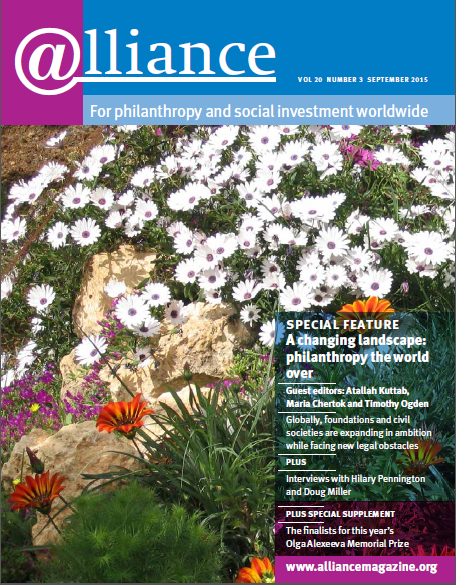In a two-day discussion at the Bosch Foundation in June, people expressed disquiet about the endurance and impact of their work. As I write, for example, both the MacArthur and Charles Stewart Mott Foundations are halting grant giving in Russia, where they’ve partnered with communities and institutions since the 1990s to help people organize effective free societies after the fall of the Soviet Union. The foundations cite new regulations that bar foreign organizations from funding actions deemed political.
Like a drumbeat, the tally of new rules rolls out.
While restrictions mount up, new wealth in rapidly growing developing economies and among technology entrepreneurs in North America and Europe means new opportunities for philanthropists. Adam Pickering, in a strident call to action, examines the balance between forces that encourage philanthropists and those that could cross-border giving. Douglas Rutzen urges foundations to ‘engage in advocacy and fund initiatives to help improve the legal environment for global philanthropy’.
While these writers press for action to protect the civil society organizations philanthropists support, others celebrate the variety of philanthropy globally. Atallah Kattub, Natasha Matic and Noha El-Mikawy, for example, relate how the tradition of ‘waqf’ – a form of charitable endowment – has evolved. In Saudi Arabia, for example, philanthropic institutions create income by building market outlets for poor farmers, decent housing for poor young families, and local health centres and pharmacies.
That commitment to philanthropy making an impact is reflected in the personal stories of short-listed Olga Alexeeva Memorial Prize nominees. Each faced obstacles to implementing their visions of giving – each persevered. ‘If we are able to speak up in defence of the rights of others to pursue their causes,’ writes Adam Pickering, ‘even those with which we do not wholly agree, history has shown we are likely to succeed.’
I accept this message as an emblem of my first issue as editor of Alliance magazine, one that will, I hope, amplify past efforts by writers to share their strategies to help others work to achieve the singular goal of making society as just as it can be.



Comments (1)
I’m ok with rules or protection of citizens and organizations if there is accountability to why they are needed and the outcome they are created to achieve. Instead of attacking the rules which could be lowering risks, lets first ask for accountability of the creation in new rules or push to adopt monitoring and risk assessments that observe the needs and outcomes to avoid more problems. Building trust in our societies and holding ourselves to standards that take into account the need to observe policies with constraint to achieve better outcomes with that don’t put people in jeopardy for the satisfaction of voicing disapporavals to continue good work that raises your social status. Look upon this as a opportunity to provide access to more communities in localaties that can tie to origins of birth or culture which has been established through past philanthropy and now can not be reached. The ability to connect those two areas through past experiences and new potential for global shifts allows the spread of goodwill to reach more. Russian communities have been overlooked in many areas not of their culture which isolated them during a politically contentious period of instability and morally corrupting antagonism. Protecting the fondation of acceptance and inclusion to build trust in providing the value they have with a supportive decree in giving what needs to have been given to retain value in our investments.